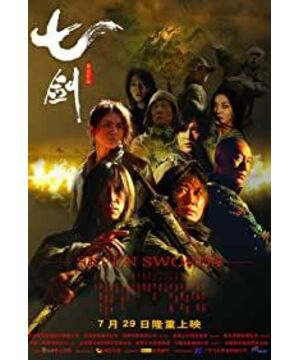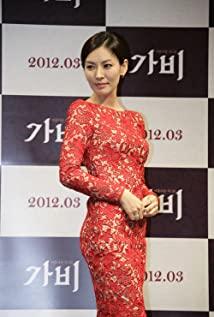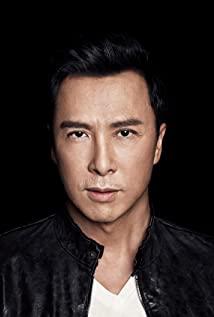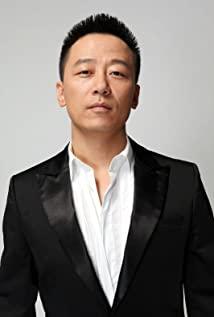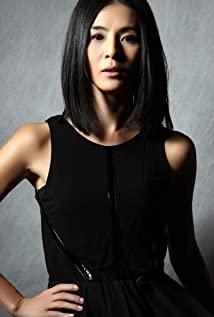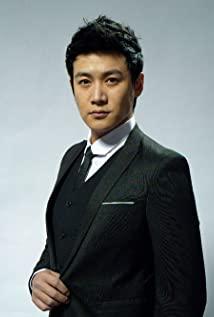In the early morning of yesterday, I sat in the Huiquan Cinema with a belly full of fire, and then I heard the clanging sound. "Seven Swords", which is as hot as this summer, has begun. Half a bottle of cold Pepsi was thrown into my stomach, and the thing called sugar stuck to my teeth and tongue. So, the whole process of watching "Seven Swords" became sweet.
Until the seven swordsmen disappeared in the dark red air, they actually felt that the air was like the color of cola, mixed with a Western-style atmosphere, and it was endless.
The Seven Swords stuck in my mind, it had always been like a comic book. This feeling almost dictates my requirements for news production. Last Friday, the Seven Swords feature of the morning paper was so refreshing and refreshing. I always felt that it should have the temperament of clear tea and snow lotus, those swords and their The sword should also be cold and cool, immortal style.
Undoubtedly, the "Seven Swords" in reality gave me a sword. This sword is still the Youlong Sword in Chu Zhaonan's hand. It was like a dragon prisoner stick, or something used by Yuchi Jingde's black servant. When you hit it, your head is broken, and there is no romance at all.
It has always been thought that the worship of weapons should be a kind of spiritual worship, which consists of weapons, people, and heroes. Rigidity is the home of rough people. This kind of thinking extends to the swordsman who has no sword in his hand, but has a sword in his heart.
Perhaps because of this reason, when I watched He Ping's "Heroes of Heaven and Earth", I felt awkward, far less exciting than watching his "Double Flag Town Swordsman". Seeing Wang Xueqi's appearance, he always thought he was an American western cowboy, who turned his spear and short spear into a long sword and short sword. I don't know whether it is a sword shadow or a flame at every moment of stabbing there.
Compared with "Heroes of Heaven and Earth", "Seven Swords" is also a product of exotic spirit. Therefore, I prefer to call it a Western in Chinese martial arts films, and of course it can also be referred to as a Western martial arts film. (Director Tsui Hark may have his reasons for this, because Tianshan was originally a barbarian area in ancient times.)
For this reason, I prefer to call "Seven Swords" as "The Legend of Seven Swords".
My reason is that in the Seven Swords, the "Character of a Hero" and the "Image of a Hero" are obviously non-Central. For example, when Mr. Jin Yong depicts warriors outside the Great Wall, he often makes them look different, that is, their dress and appearance are rather odd, such as the famous camel in Saibei in "Swordsman", and another example in "Dragon Babu". The Kumozhi in "The Legend of Condor Heroes" and the Golden Wheel Dharma King in "The Legend of Condor Heroes" are all weird masters.
As for the character, these knights are all "practical and rational", with obvious utilitarianism. Saibei Mingtuo wants to practice "Evil Sword Art", Kumozhi wants to practice "Six Meridians Excalibur", Jinlun Fawang wants to Become the leader of the Central Plains Martial Arts Alliance.
Coinciding with Jin Yong, the Seven Swords created by Tsui Hark also have distinct dissimilarities and practical rationality. Not to mention that the "logging saw" in the hands of Han Zhibang can only be seen in the old Northeast Forestry Base, the name "Wind and Fire" alone, the clothes on his old man's body, and the grimace and punk head of his men, It makes people feel that there are too many fashion factors in it.
From this, I also think that if "Seven Swords" wants to develop online products, it is the best, the weapons of the frontal characters and the armor and shields of the negative sides can become the glory that netizens compete for.
In Chinese philosophy, the obsession with appearance and color is itself a kind of low-level taste, and Chinese philosophy even advocates that the highest good is like water, and the Tao is invisible. As a result, Zhang Sanfeng's most powerful kung fu is forgetting words, and Zhou Botong's left-right fighting technique evolved from the Jiuyin Sutra is also based on a set of forgetting rules. And Tsui Hark's "Seven Swords" is full of fascination with implements. In fact, no matter how tough something is, there must be a nemesis to destroy it. If the Youlong Sword and Qingyun Sword were not half-forged, but completely formed, would there be no Wu Xiao who could overcome them? I don't think so.
In contrast, I like the Tianpu sword in Wu Yuanying's hands. It has no tricks and no formulas, and it can be made at will. Compared with the flute, there is a bit of the essence of Chinese martial arts in it. In my opinion, it is the most reliable martial arts spirit in "Seven Swords".
Compared with the appearance, the practical rationality shown in "Seven Swords" does more damage to the connotation of the film. It is not only unreliable in interpreting the charm of martial arts, but it is even more regrettable that Tsui Hark lost the spiritual beauty of the redemption of Xia, and lowered the redemption to a level of strategy.
Although before the film was released, Tsui Hark said that the inspiration for "Seven Swords" came from Akira Kurosawa's "Seven Samurai", and he regarded "Seven Swords" as his own expression to the film master Akira Kurosawa from his heart. A kind of modest and graceful nostalgia and respect. However, in my opinion, "Seven Swords" and Kurosawa's "Seven Samurai" are basically two products in terms of temperament.
Akira Kurosawa's "Seven Samurai" reflects the beauty of the spirit of human redemption in a soothing way. The film contains both the samurai's redemption for farmers and the self-cleaning of the samurai spirit. Akira Kurosawa uses the film to restore the survival of the samurai. With the survival of farmers, selflessness and selfishness are placed together to complement each other, thus deepening the content of the film; while Tsui Hark's "Seven Swords" is relatively flat, the redemption it embodies is one-sided, basically To save people and help the poor, Han Zhibang was still in love with his sons and daughters until the end. It seems that he was forced to return to the "Seven Swords", and his spirit has hardly improved; and Mo Wenjian, Fu Qingzhu, is basically a strategist and a commander. , the depiction of human nature is extremely single; Jingxing sword Xin Longzi and Sun Moon sword Mu Lang are also lonely and lonely, happy and happy, very flat; only Qing Qianjian Yang Yuncong is somewhat interesting, and there is a bit of self-transcendence.
On the whole, the rescue of the "Seven Swords" for the people of Wuzhuang is too rational and full of strategies. It can even be said that sometimes the brilliance of the strategy overwhelms the brilliance of human nature. For example, the show of letting the horses, the show of finding a traitor, and the show of destroying the treasure house are all pragmatic, and they are done for what, with a simple purpose and a will to win. But when it's done, it's done, and it leaves people with no aftertaste.
This also makes me more willing to see "Seven Swords" as the fundamental reason for a fully commercial film. So, as a commercial film, is "Seven Swords" a good-looking movie? I can say, it's good-looking. But it's just beautiful.
I even think that "Seven Swords" is just a deepening of the Hong Kong martial arts genre. The reason why it is said that he is a Hong Kong martial arts genre film is because he does not go beyond the stereotype of Hong Kong martial arts films featuring entertainment. In the Hong Kong martial arts genre, plot and action are the two core elements; the story of "Seven Swords" is compact and very gripping. With a smooth and pleasant feeling, it is very suitable for the characteristics of Hong Kong martial arts genre films. Coupled with the character's cold humor, the character of Hong Kong's commercial films has inherited the nonsensical entertainment characteristics of Hong Kong commercial films. In addition to making people nervous, there is a relaxed smile from time to time.
The reason why it is said to be deepening is because the film is more sophisticated in production, not a shoddy Hong Kong martial arts film. It combines the advantages of Tsui Hark's "New Shushan Swordsman", "The Swordsman", and even "New Dragon Gate Inn" (directed by Li Huimin and supervised by Tsui Hark). sexual works.
Another deepening level is that "Seven Swords" more perfectly reflects the aesthetic taste of modern society and the commercial awareness of modern movies. Here are a few examples:
Example 1: The harmony between animals and people. The relationship between Han Zhibang and the horse-loving "Laifu" reminds people of the American movie "The Horse Whisperer". This narrative about horses is roughly estimated to last about two minutes. It reflects the harmony and harmony between animals and people. beautiful.
Example 2: Happiness. The dialogue between Lu Zhu and Chu Zhaonan before the passionate drama begins, reflects the meaning of happiness to people's personal survival. A person is not afraid of death because she has nothing. When she has everything, when she is happy, she is afraid of death.
Example 3: Love and trust. Or Luzhu and Chu Zhaonan. When the two faced off, Chu Zhaonan said a word in Chinese, Lu Zhu said that you don't trust me, do you doubt me too? It reflects the crisis of trust in the modern love system.
Example 4: Home Awareness. It is still Luzhu and Chu Zhaonan. Both of them came from the Yalu River, and Chu Zhaonan constantly aroused the consciousness of Luzhu's family, which was the embodiment of the idea of finding a home. In addition, the setting of these two characters cannot rule out Tsui Hark's ambition to win the Korean box office.
Example 5: Game of Interests. The wind and fire link the city and the prince. What is unfolding between them is a game of interests, there are no eternal friends, eternal rank, only eternal interests. This value runs unimpeded in Western cinema.
Example 6: Love at first sight. Liu Yufang fell in love with Chu Zhaonan at first sight, and said it bravely before he joined Han Zhibang. This concept of love and chastity is also very selling.
Example 7: Understanding. Zhaoming and friends. The little friend abandoned him because of Hua Zhao's "betrayal", but Hua Zhao proved himself with his actions, and everyone joined hands and heart to heart.
Example 8: Distance. Yang Yuncong and Wu Yuanying. Yang Yuncong said that the farther the distance, the easier it is to lose. So he chose to keep his distance from Wu Yuanying, who loves him.
Example 9: The enemy. Wuzhuang people and green beads. People who have nothing to do with you are not necessarily your enemies, and people who are close to you may often be the ones who want to kill you.
...
too many examples.
The reason why so many modern consciousnesses appear in the film can also be divided into two aspects. On the one hand, the spiritual demands of modern films, especially commercial films, must meet the psychological needs of modern film consumers, and must be projected from the film. Realistic values in the commercial society, if the concept is outdated, it is often not accepted by movie fans; on the other hand, it is the personal appeal of the film director. In my opinion, "Seven Swords" can be called "Crouching Tiger, Hidden Dragon". " and "Hero" after another peak of martial arts movies.
Among the three films, I admire Crouching Tiger, Hidden Dragon the most, because director Ang Lee has the deepest understanding of Eastern and Western cultures. Refined; Ang Lee's martial arts is like an ink painting of suitable shades, and every picture exudes a warm feeling. The way of chivalry and the way of life are organically unified.
As for Zhang Yimou, his understanding of ancient Chinese culture has his own characteristics. He likes to start from the big picture too much. Zhang Yimou's biggest problem is that he is too charismatic and utilitarian, so that "not the Chinese nor the Western" goes into trouble.
On the other hand, Tsui Hark has a relatively thorough understanding of business culture. His films can achieve the unity of expression and modern consciousness, but his understanding of Chinese culture is superficial. In fact, not only Tsui Hark, but almost all Hong Kong directors will expose this flaw when they reflect on their nationality. They are obviously not as good as mainland directors or Taiwanese directors when it comes to cracking the motif of Chinese culture. The fundamental evolution is that Hong Kong movies have always been surging on the cusp of the waves. It cannot sink, and it unconsciously reveals the tail of colonialism, which makes people laugh.
As a result, "Seven Swords" is also bound to be labeled as a Hong Kong film. Through this label, you can see the trending factors in the development of modern films, indulge in the beauty of the senses, and lose the profound national culture. kernel.
I think, for Tsui Hark, there may be no other choice. He does not have the temperament of Ang Lee, nor the good sense of form of Zhang Yimou. If he wants to make the film well, it must be based on speed and strength. As a result, while watching "Seven Swords", I joked with my friends that he can make you sleepless and make you more dizzy than "Heroes".
After Lara Zaza wrote this, I don't know if it's reliable or not? Also invite readers and fans to the cinema to confirm it.
July 29, 2005
View more about Seven Swords reviews


